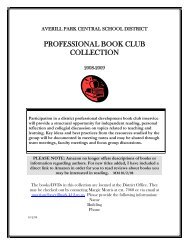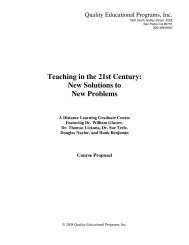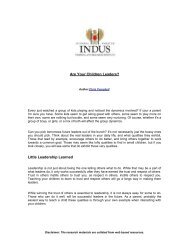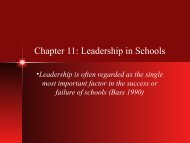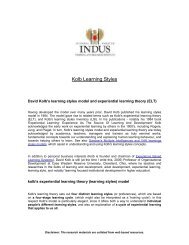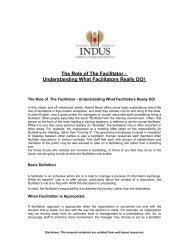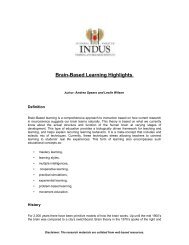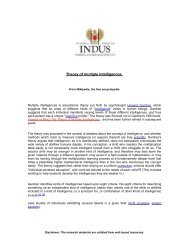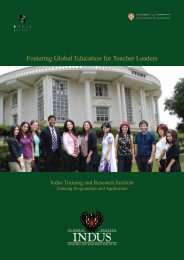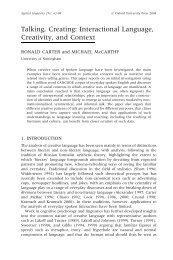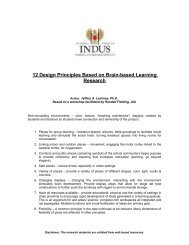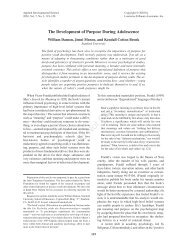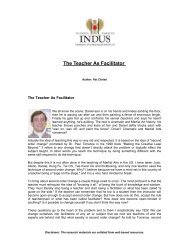Primary Years Programme Making the PYP happen - ITARI
Primary Years Programme Making the PYP happen - ITARI
Primary Years Programme Making the PYP happen - ITARI
- No tags were found...
You also want an ePaper? Increase the reach of your titles
YUMPU automatically turns print PDFs into web optimized ePapers that Google loves.
<strong>Making</strong> <strong>the</strong> <strong>PYP</strong> <strong>happen</strong><br />
Fur<strong>the</strong>r questions: language<br />
Language: transdisciplinary language—in a social studies unit of inquiry (Islam)<br />
Form<br />
Function<br />
Causation<br />
Change<br />
Connection<br />
Perspective<br />
Responsibility<br />
Reflection<br />
What language(s) do Islamic<br />
peoples use<br />
Is <strong>the</strong>re a written form<br />
What is <strong>the</strong> language like<br />
Does <strong>the</strong> language have a<br />
different structure from ours<br />
Does it have different<br />
vocabulary<br />
What part does literature play<br />
in <strong>the</strong> developments of a<br />
culture<br />
Are <strong>the</strong>re various dialects and<br />
accents in Arabic<br />
How important is Arabic as a<br />
world language<br />
What part does language play<br />
in cultural identity<br />
What historical influences<br />
have shaped <strong>the</strong> Arabic<br />
language<br />
To what extent does language<br />
influence thinking styles<br />
How do forms of Arabic differ<br />
in different geographical<br />
locations<br />
How has Arabic changed<br />
historically<br />
What are <strong>the</strong> similarities and<br />
differences between Arabic<br />
and o<strong>the</strong>r languages we know<br />
Do all Islam followers speak<br />
<strong>the</strong> same language<br />
Did <strong>the</strong> Arabic language exist<br />
before <strong>the</strong> Islamic religion<br />
How could knowledge of <strong>the</strong><br />
Arabic language help us<br />
understand <strong>the</strong> Islamic culture<br />
Is non-Islamic writing about<br />
Islam biased<br />
Are some languages better<br />
than o<strong>the</strong>rs<br />
Are some languages more<br />
important than o<strong>the</strong>rs<br />
Are some languages easier to<br />
learn than o<strong>the</strong>rs<br />
How can use of language<br />
influence people<br />
How does our use of language<br />
influence our view of certain<br />
people<br />
Why is it our responsibility<br />
not to form stereotypes<br />
How should we treat people<br />
who speak different languages<br />
from us<br />
How can literature help us<br />
understand a culture<br />
Did we have information from<br />
primary sources<br />
Did we only rely on secondary<br />
sources<br />
Which is <strong>the</strong> more valuable<br />
source Why<br />
Language: metalanguage—names<br />
Form<br />
Function<br />
Causation<br />
Change<br />
Connection<br />
Perspective<br />
Responsibility<br />
Reflection<br />
What is a name<br />
What are <strong>the</strong> special words<br />
used for <strong>the</strong> names of things<br />
Why do some names have<br />
capital letters and o<strong>the</strong>rs not<br />
What do names tell us about<br />
<strong>the</strong> things <strong>the</strong>y name<br />
How can <strong>the</strong> study of place<br />
names tell us more about<br />
historical events<br />
Why do we name things<br />
How have <strong>the</strong> physical<br />
features of <strong>the</strong> earth affected<br />
<strong>the</strong> development of language<br />
How do geomorphological<br />
features get <strong>the</strong>ir names<br />
How do people get <strong>the</strong>ir names<br />
How do places get <strong>the</strong>ir names<br />
What has influenced <strong>the</strong><br />
development of <strong>the</strong> language<br />
of specific disciplines<br />
When can people’s names<br />
change<br />
Why do names go in and out<br />
of fashion<br />
Why do people’s names change<br />
when <strong>the</strong>y are married<br />
What are <strong>the</strong> origins of names<br />
How are people’s names<br />
connected to <strong>the</strong>ir religion<br />
Which languages have<br />
influenced <strong>the</strong> development of<br />
English<br />
Why do names for <strong>the</strong> same<br />
features differ from culture to<br />
culture<br />
How do people’s names differ<br />
in different cultures<br />
If we pronounce a name<br />
differently is it still <strong>the</strong> same<br />
name<br />
What might be <strong>the</strong><br />
consequences of careless<br />
naming of new discoveries,<br />
inventions, etc<br />
Does everyone have <strong>the</strong> right<br />
to a name<br />
How can <strong>the</strong> study of names<br />
contribute to our knowledge<br />
about o<strong>the</strong>r disciplines<br />
Language: literature—picture books<br />
Form<br />
Function<br />
Causation<br />
Change<br />
Connection<br />
Perspective<br />
Responsibility<br />
Reflection<br />
What kind of picture books are<br />
<strong>the</strong>re<br />
What are <strong>the</strong> parts of a book<br />
What is <strong>the</strong> balance between<br />
picture and text<br />
How are books made<br />
What illustration techniques<br />
have been used<br />
What kind of pattern is <strong>the</strong><br />
book based on<br />
What materials can be used<br />
How do <strong>the</strong> pictures and text<br />
work toge<strong>the</strong>r<br />
What are <strong>the</strong> main elements of<br />
a story<br />
Do books play <strong>the</strong> same role in<br />
all cultures In all families<br />
What do we use books for<br />
Can books be misused<br />
How do picture books<br />
compare with o<strong>the</strong>r literary<br />
forms<br />
How are books by <strong>the</strong> same<br />
author similar/different<br />
Why did this author choose<br />
this story<br />
Why did <strong>the</strong> illustrator choose<br />
this style of illustration<br />
How have picture books<br />
changed historically<br />
How do our<br />
preferences/opinions change<br />
as we get older<br />
How have <strong>the</strong> materials used<br />
for books changed<br />
How does <strong>the</strong> role of<br />
illustrations change in books<br />
for older people<br />
How do picture books<br />
compare with o<strong>the</strong>r literary<br />
forms<br />
How are books by <strong>the</strong> same<br />
author similar/different<br />
How can reading help our<br />
language development<br />
How is this book<br />
similar/different to o<strong>the</strong>rs we<br />
have read<br />
How do <strong>the</strong> pictures help us to<br />
understand <strong>the</strong> text<br />
How do picture books differ in<br />
different cultures<br />
Do books have <strong>the</strong> same role<br />
in all cultures<br />
Why do picture books appeal<br />
particularly to younger<br />
readers<br />
What influence does <strong>the</strong> cover<br />
have on our thoughts about <strong>the</strong><br />
book<br />
How do <strong>the</strong> illustration<br />
techniques reflect <strong>the</strong> culture<br />
Why might some people finds<br />
some books objectionable<br />
Do all children have access to<br />
books<br />
How much does a reader have<br />
to bring to a book<br />
What is <strong>the</strong> author’s<br />
responsibility to avoid bias<br />
and stereotyping<br />
What can we learn from this<br />
book about human nature and<br />
world issues<br />
Should we censor some books<br />
Who should decide which are<br />
censored<br />
Why do some people never<br />
learn to read<br />
What kind of messages do<br />
authors try to convey to readers<br />
How does discussing a book<br />
develop our understanding of it<br />
How does analysing a book<br />
develop our understanding of it<br />
How do illustrations add to<br />
our understanding<br />
What does this book tell us<br />
about ourselves<br />
What does it tell us about<br />
o<strong>the</strong>rs<br />
Figure 21 Fur<strong>the</strong>r questions: language<br />
© IBO 2000 53



